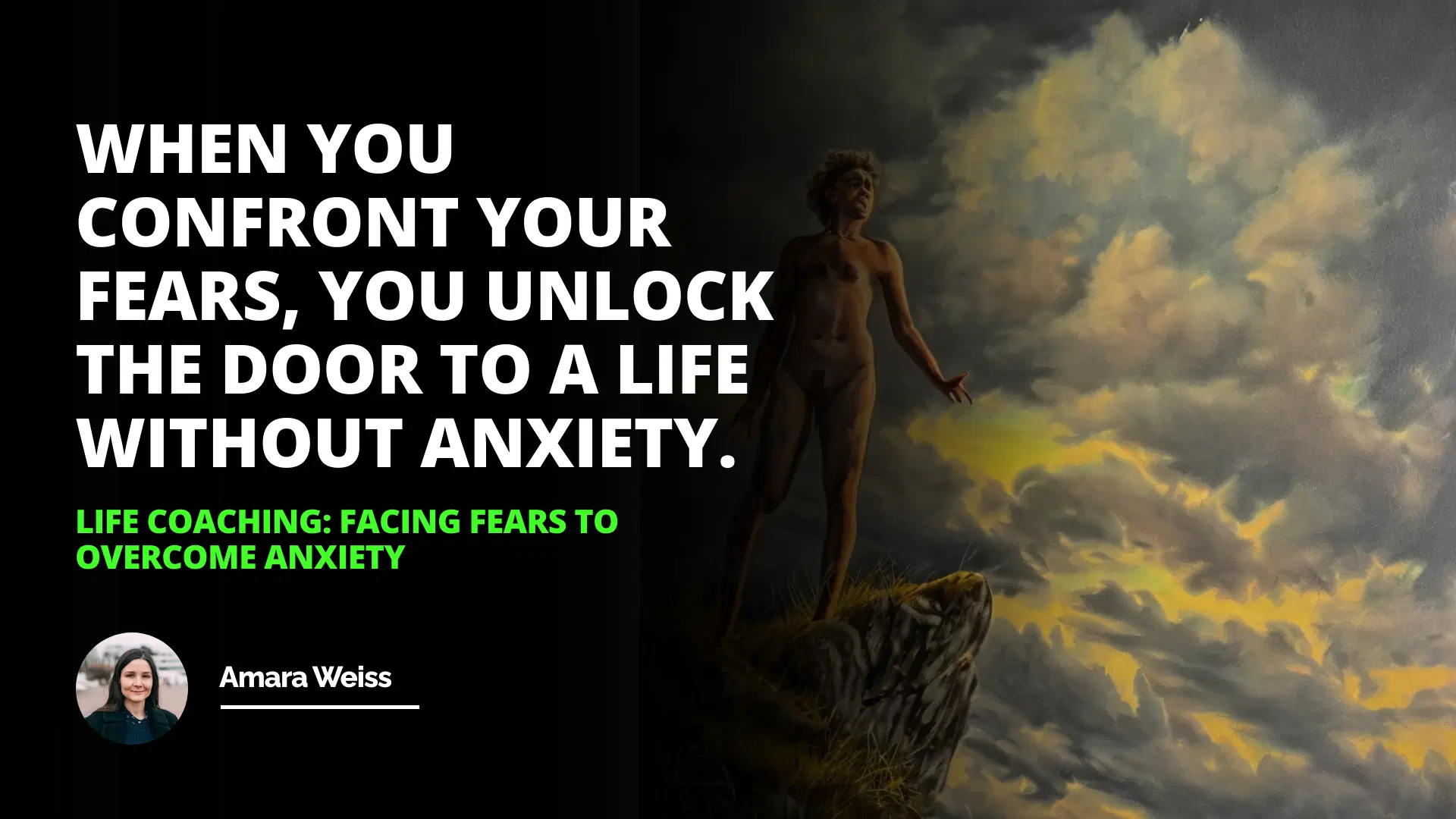
Anxiety is a common thread that weaves through many of our lives. I remember the first time I felt its grip—it was during a school play in fifth grade. My heart raced, palms sweated, and the room seemed to blur as I stepped onto the stage. That feeling of unease, that overwhelming fear, is something many of us can relate to. But what if I told you that understanding anxiety and learning to face our fears can unlock a life of fulfillment and peace?
Introduction
Understanding Anxiety
Facing Fears to Overcome Anxiety
Redefining ‘Awful’
Taking Action Despite Anxiety
Understanding Anxiety
Anxiety isn't just nervousness before a big event; it's an emotion characterized by feelings of tension, worried thoughts, and physical changes like increased blood pressure. According to Dr. Claire Weekes in Hope and Help for Your Nerves, anxiety manifests when we're faced with situations that are uncertain or perceived as threatening[^1]. It can be a normal part of life, but for some, it becomes a chronic condition that interferes with daily activities.
The Physical and Mental Manifestations
Anxiety can show up in various ways:
Physical Symptoms:
Sweating
Increased heart rate
Difficulty breathing
Mental Symptoms:
Racing thoughts
Difficulty concentrating
Intrusive thoughts
These symptoms can be overwhelming, but recognizing them is the first step toward managing anxiety.
Facing Fears to Overcome Anxiety
The obvious way to deal with anxiety is to face your fears. I recall a time when I was terrified of public speaking. Instead of avoiding it, I joined a local toastmasters club. Slowly but surely, speaking in front of others became less daunting.
Creating a Fear Hierarchy
Psychologist Dr. John Marshall recommends working through a hierarchy of fears[^2]:
1- List your fears from least to most frightening.
2- Start with the least scary situation.
3- Gradually expose yourself to each level.
By tackling fears incrementally, we challenge our anxiety in a way that's manageable and effective.
Redefining ‘Awful’
Often, our language shapes our reality. Phrases like "I can't stand it" or "It would be awful if that happened" can amplify anxiety. But what does "awful" really mean? Are we predicting our imminent doom or a catastrophic outcome?
Changing Our Narrative
Instead of: "It would be awful if I failed this test."
Try: "It would be disappointing if I didn't do as well as I'd like."
This shift from catastrophic thinking to realistic appraisal makes challenges seem less insurmountable.
The Power of Words
Words carry weight. By redefining negative terms, we reduce their impact on our emotions. It's like optimizing a supply chain management process—by identifying inefficiencies (negative words), we can implement tips to improve flow and outcomes.
Taking Action Despite Anxiety
Once we've identified our fears and redefined the "awful," it's time to take action. This can be the most challenging step, but it's also the most rewarding.
Cognitive and Behavioral Techniques
1- Cognitive Techniques:
Challenge irrational thoughts. Are you catastrophizing?
Replace negative beliefs with positive affirmations.
2. Behavioral Techniques:
Gradual exposure to feared situations.
Relaxation methods like deep breathing or meditation.
According to The Anxiety and Phobia Workbook by Dr. Edmund Bourne, combining these techniques can significantly reduce anxiety symptoms[^3].
Embracing the Journey
It's important to remember:
Anxiety is normal in certain situations.
Progress takes time.
You're not alone—many people are on this journey.
Personal Reflections
Looking back, facing my fears wasn't easy. There were setbacks and moments of doubt. But each small victory built upon the last. Here are some techniques that helped me overcome anxiety and fear:
Journaling: Writing down my thoughts helped me identify patterns.
Mindfulness: Staying present reduced worries about the future.
Support Systems: Talking with friends and family provided comfort.
The Role of Professional Help
Sometimes, self-help strategies aren't enough. Seeking professional assistance is a sign of strength, not weakness.
When you confront your fears, you unlock the door to a life without anxiety.
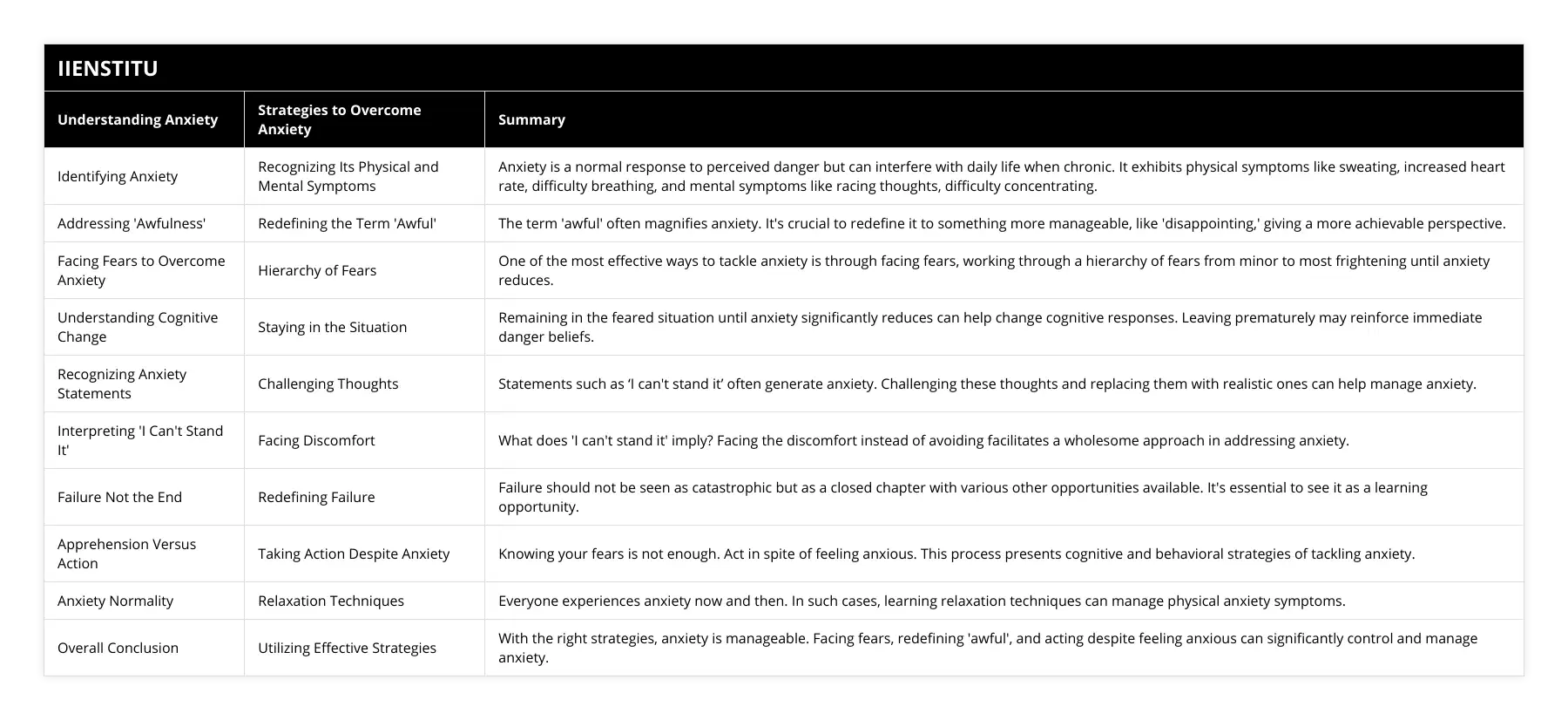
When to Seek Help
Persistent anxiety that interferes with daily life.
Physical symptoms that are unmanageable.
Feelings of hopelessness or depression.
Therapists can provide personalized strategies and cognitive-behavioral therapy, which has been proven effective[^4].
Overcoming Anxiety: A Lifelong Process
Anxiety may not completely disappear, but it becomes manageable. Like any process, such as when companies seek to optimize supply chain management process tips, handling anxiety requires continuous effort and adaptation.
Tips for Managing Anxiety in Everyday Life
Stay Active: Regular exercise can reduce stress.
Eat Well: Nutrition impacts mood and energy levels.
Get Enough Sleep: Rest is crucial for mental health.
Stay Connected: Maintain relationships and social activities.
These methods contribute to a holistic approach to anxiety management.
Conclusion
Anxiety doesn't have to control your life. By understanding it, facing your fears, redefining negative thoughts, and taking action, you can overcome the barriers it presents. Remember, it's normal to feel anxious at times, but with the right tools and techniques, you can navigate these feelings and lead a fulfilling life.
When you confront your fears, you unlock the door to a life without anxiety.
References
[^1]: Weekes, C. (1962). Hope and Help for Your Nerves. New York: Signet Books.
[^2]: Marshall, J. (2010). Facing Your Fears: A Guide for Managing Anxiety. Chicago: Health Press.
[^3]: Bourne, E. (2015). The Anxiety and Phobia Workbook. Oakland: New Harbinger Publications.
[^4]: Beck, A. (1993). Cognitive Therapy of Anxiety Disorders. New York: Guilford Press.
Frequently Asked Questions
What strategies can a life coach use to help someone face their fears and overcome anxiety?
Anxiety and fear are emotions that can limit an individual's ability to take risks and move forward in life. The role of a life coach is to help individuals develop strategies to face their fears and overcome anxiety. This article will discuss the various methods a life coach can use to help someone face their fears and overcome anxiety.
The first step in helping someone face their fears and overcome anxiety is identifying the source of the fear and anxiety. A life coach can help an individual determine what is causing the fear and anxiety and then work with the individual to develop strategies to address the underlying issues. This can include exploring the individual's beliefs and core values, setting achievable goals, and creating a plan to move forward.
The second step a life coach can take is to help the individual develop coping skills to manage their fear and anxiety. This can include teaching breathing and relaxation techniques, such as meditation, deep breathing, and progressive muscle relaxation. Additionally, a life coach can help an individual develop a healthy lifestyle, including a nutritious diet, regular exercise, adequate sleep, and social activities.
The third step a life coach can take is to help the individual set realistic goals. Setting achievable goals and milestones allows individuals to track their progress and feel accomplished. This can help build confidence and reduce anxiety.
The fourth step a life coach can take is to provide support and encouragement. A life coach can provide a safe and supportive environment for individuals to discuss their fears and anxieties. Additionally, a life coach can provide guidance, resources, and validation to help the individual feel empowered and capable of overcoming their fears and anxieties.
Finally, a life coach can help individuals develop positive self-talk and challenge negative thoughts. This can help individuals reframe their ideas and create a more positive outlook.
In conclusion, a life coach can help an individual face their fears and overcome anxiety by identifying the source of the fear and anxiety, developing coping skills, setting realistic goals, providing support and encouragement, and developing positive self-talk. Through these strategies, a life coach can help an individual create a plan for overcoming anxiety and moving forward.
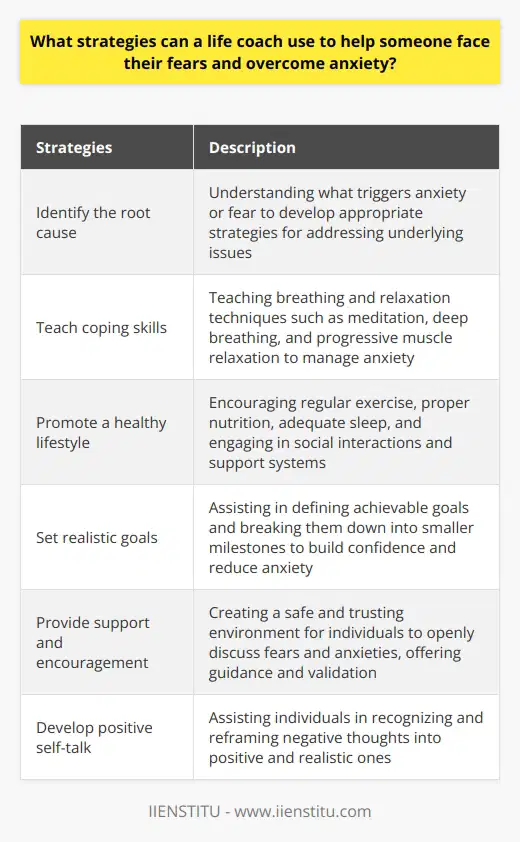
How can life coaching help someone redefine their perception of ‘awful’?
Life coaching is an increasingly popular form of self-development that seeks to empower individuals to make positive changes in their lives by helping them to identify and better understand their goals, strengths, weaknesses, and values. By working with a life coach, individuals can gain self-awareness and new perspectives on their current circumstances and create achievable plans to help them move forward. In this article, we will explore how life coaching can help someone redefine their perception of ‘awful’.
When an individual perceives a situation as ‘awful,’ it can be challenging to move on from this opposing viewpoint. This is because ‘awful’ is often associated with despair, hopelessness, and helplessness. When an individual is stuck in this negative mindset, making constructive changes in their life can be difficult. Life coaching can help individuals redefine their perception of ‘awful’ by identifying and addressing the underlying issues causing their negative feelings.
Life coaching can help individuals identify and address the underlying causes of their negative attitudes. This can be achieved by exploring the individual’s current circumstances, such as their relationships, career, and financial situation. By exploring these areas, the life coach can help the individual uncover patterns of behavior contributing to their negative attitude. The life coach can then help the individual to develop strategies to address these issues, such as setting achievable goals, creating an action plan, and building a support network.
Once the individual has identified and addressed the underlying causes of their negativity, the life coach can help them redefine their perception of ‘awful.’ This can be achieved by assisting the individual in focusing on the positive aspects of their current circumstances, such as their strengths, skills, and values. Additionally, the life coach can provide the individual with tools and techniques to help them to develop a more positive attitude, such as mindfulness, visualization, and goal-setting.
In conclusion, life coaching can help individuals redefine their perception of ‘awful’ by identifying and addressing the underlying causes of their negative attitude and providing them with tools and techniques to develop a more positive outlook. With the support of a life coach, an individual can gain self-awareness and develop achievable plans to help them move forward in life.
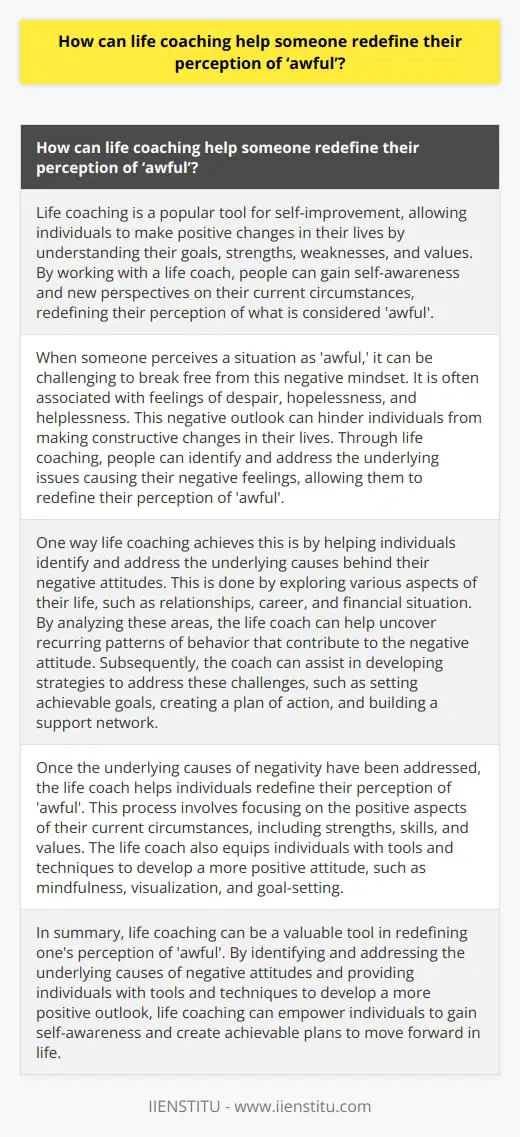
What action steps can someone take to manage their anxiety despite feeling fearful?
Anxiety is a common emotion experienced by many people. Despite feeling fearful, there are action steps that an individual can take to manage their anxiety. The first step is to be aware of the signs and symptoms of anxiety. Some symptoms include difficulty concentrating, feeling restless and agitated, or sleeping. Once an individual is aware of the signs and symptoms of anxiety, they can take steps to manage it.
The first step in managing anxiety is to practice relaxation techniques. Relaxation techniques include deep breathing exercises, progressive muscle relaxation, and guided imagery. Deep breathing exercises can help to reduce stress and regulate breathing, while progressive muscle relaxation helps to relax tense muscles. Guided imagery involves visualizing a peaceful scene or activity to help relax the body and mind. Practicing relaxation techniques can help to reduce the physical symptoms of anxiety and can help to reduce the overall feeling of fear.
The second step in managing anxiety is to develop a healthy lifestyle. This can include getting enough sleep, eating a balanced diet, and exercising regularly. Developing healthy habits can help to reduce stress and can help to reduce the feeling of fear. Additionally, it is essential to find activities that can help reduce fear and provide a sense of relaxation. Examples of activities that can help reduce anxiety include yoga, meditation, and outdoor activities.
The third step in managing anxiety is to reach out for support. Talking to a friend or family can be a great way to express feelings and receive support. Additionally, seeking professional help from a mental health professional can help manage anxiety. A mental health professional can provide techniques and strategies to help manage stress and can provide support in times of distress.
In conclusion, managing anxiety despite feeling fearful can be difficult. However, individuals can take action steps to manage their anxiety by being aware of the signs and symptoms of stress, practicing relaxation techniques, developing a healthy lifestyle, and reaching out for support.
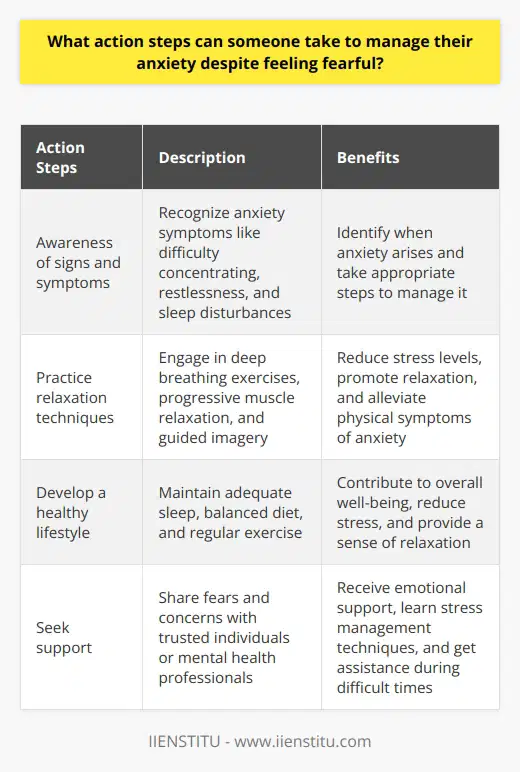
Can you overcome anxiety by facing your fears?
Overcoming Anxiety through Exposure
Anxiety can significantly impact an individual's daily life, creating an urgent need for effective ways to manage or overcome it. One of the most studied and utilized techniques to overcome anxiety is by facing one's fears, also known as exposure therapy. Psychologists and mental health professionals widely employ this evidence-based approach to help clients confront and reduce their anxiety towards specific situations or objects.
Essence of Exposure Therapy
Exposure therapy can be applied through various forms, such as in vivo exposure, imaginal exposure, and virtual reality exposure. Each method serves to safely confront the individual with their fear, allowing them to repeatedly experience the anxiety-provoking situation until their anxiety response diminishes. It is important to note that this process is gradual and carefully controlled by the therapist to prevent unnecessary distress and counterproductive treatment outcomes.
Support from Research and Studies
Numerous research studies have demonstrated the effectiveness of exposure therapy, particularly for specific anxiety disorders like phobias, social anxiety, and obsessive-compulsive disorders. A meta-analysis by Norton and Price (2007) reported that exposure therapy effectively reduced anxiety symptoms, with more significant improvements observed in those receiving prolonged, repeated exposure. Furthermore, Öst (2014) found that exposure methods provided long-term results and increased generalization to other anxiety-provoking situations.
Cognitive-Behavioral Approach
Exposure therapy is often combined with other cognitive-behavioral techniques to address the multiple aspects of anxiety. For instance, cognitive restructuring helps the individual identify and challenge their irrational beliefs and thought patterns about the feared situation. According to Craske and Barlow (2007), incorporating cognitive components alongside exposure significantly enhances treatment efficacy and maintains its long-term gains.
Individual Differences and Tailored Treatments
While exposure therapy has proved effective for many individuals experiencing anxiety, it is essential to consider individual differences and the suitability of the approach. Some individuals may find exposure-based techniques overly distressing or struggle to engage in the process. In such cases, therapists can consider adjusting the level of exposure intensity or employing alternative treatment strategies. Ultimately, an individualized, tailored approach is critical for successful anxiety intervention and long-lasting improvements.
In conclusion, facing one's fears through exposure therapy can effectively help individuals overcome anxiety, especially when applied with other cognitive-behavioral techniques. Although not suitable for everyone, exposure remains a valuable tool for reducing and managing anxiety symptoms in a range of anxiety disorders, enabling individuals to regain control and improve their daily life functioning.
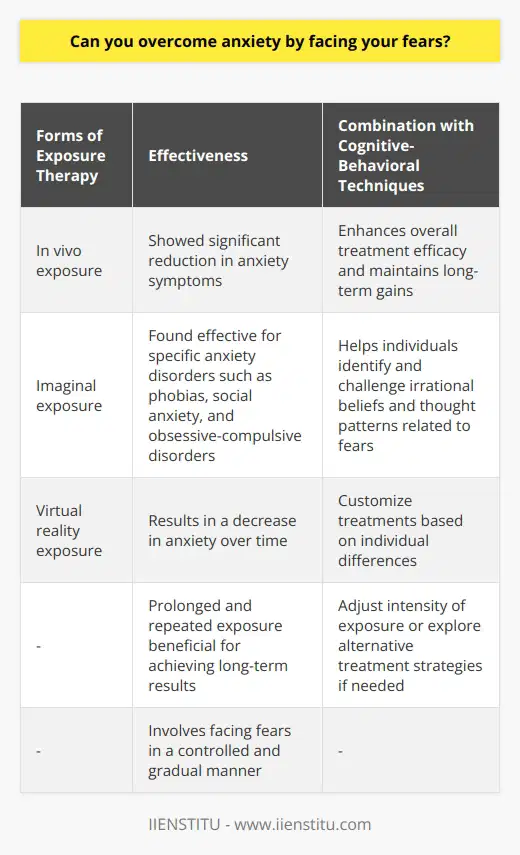
How do you life coach someone with anxiety?
Understanding Anxiety
To effectively life coach someone with anxiety, one must first develop a deep understanding of the nature of anxiety and its impact on daily functioning. Anxiety is a feeling of unease, often accompanied by excessive worry and fear. It can manifest in various forms, such as generalized anxiety disorder, panic disorder, or social anxiety disorder. When left unaddressed, anxiety can negatively affect a person's mental, emotional, and physical well-being.
Establishing Rapport and Building Trust
As a life coach, establishing rapport and building trust with a client who suffers from anxiety is crucial. This involves creating a safe, non-judgmental environment where the client feels free to express their thoughts, feelings, and concerns. It is essential to listen actively and empathetically, offering validation, encouragement, and gentle guidance. Demonstrating genuine care, understanding, and support can make clients more comfortable and willing to engage in the coaching process.
Setting Realistic Goals
Developing realistic, achievable goals is an important aspect of coaching individuals with anxiety. Breaking down long-term objectives into smaller, incremental steps can help clients feel less overwhelmed and facilitate progress. It is vital to ensure that goals are specific, measureable, attainable, relevant, and time-bound (SMART) to increase the likelihood of success. Additionally, devising action plans and providing tools to overcome challenges can help clients feel empowered and motivated.
Teaching Coping Strategies
Equipping clients with effective coping strategies is an essential component of life coaching for anxiety. This might include teaching relaxation techniques such as deep breathing exercises, progressive muscle relaxation, and mindfulness meditation. Cognitive-behavioral approaches can also be beneficial, helping clients identify and challenge unhelpful patterns of thinking that exacerbate anxiety. Encouraging clients to maintain a healthy lifestyle, including regular exercise, proper nutrition, and adequate sleep, can also contribute to improved mental health.
Evaluating Progress and Providing Support
Throughout the coaching process, it is important to continuously evaluate the client's progress towards achieving their goals. This includes monitoring their levels of anxiety, tracking successes, and regularly revisiting goals to ensure they remain relevant and achievable. Honest, constructive feedback on the client's performance can help them recognize their growth and develop confidence in their abilities. As a life coach, providing ongoing support and motivation is essential to facilitate the client's continued success in managing their anxiety.
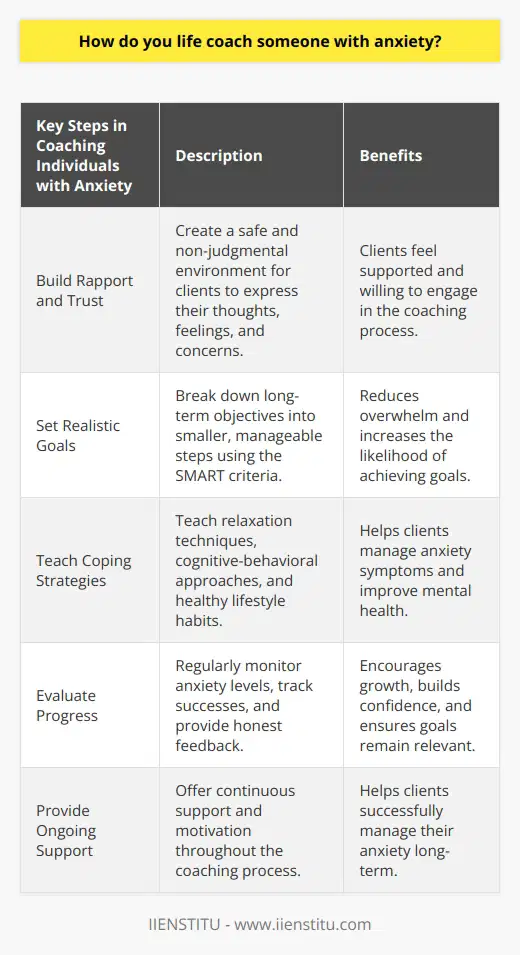
Can a life coach help with anxiety?
Life Coach's Role in Managing Anxiety
A life coach can be a valuable resource in helping individuals manage and cope with anxiety. They are trained professionals who assist clients in setting and achieving personal and professional goals, enhancing self-awareness, and promoting overall mental health and well-being.
Goal Setting and Achievement
One key element in reducing anxiety is through setting and achieving realistic goals. A life coach can help clients identify their core values and align them with attainable goals. This process can alleviate stress and promote feelings of accomplishment.
Enhancing Self-Awareness
Greater self-awareness can lead to a better understanding of triggers and coping mechanisms for anxiety. Life coaches provide tools to develop this self-awareness, empowering clients to make informed choices in managing their anxiety.
Techniques to Reduce Anxiety
Life coaches teach coping strategies tailored to the needs of the individual. Techniques such as mindfulness, meditation, and deep breathing exercises can be implemented to help clients manage their anxiety levels effectively.
Building Resilience
By addressing obstacles and setbacks, a life coach can help build resilience in individuals struggling with anxiety. Developing resilience fosters self-confidence and encourages clients to successfully handle future challenges.
Accountability and Support
A life coach offers non-judgmental support, guidance, and encouragement, providing clients with a safe space to discuss their anxieties. Furthermore, they hold clients accountable for adhering to the action plans designed to address and manage anxiety.
In conclusion, a life coach can play a significant role in helping individuals with anxiety by providing guidance and tools for goal-setting, enhancing self-awareness, teaching coping strategies, fostering resilience, and offering accountability and support. Although the efficacy of life coaching in managing anxiety is dependent on the individual's motivation and commitment, working with a life coach can be particularly beneficial for those seeking a personalized and holistic approach to stress and anxiety management.
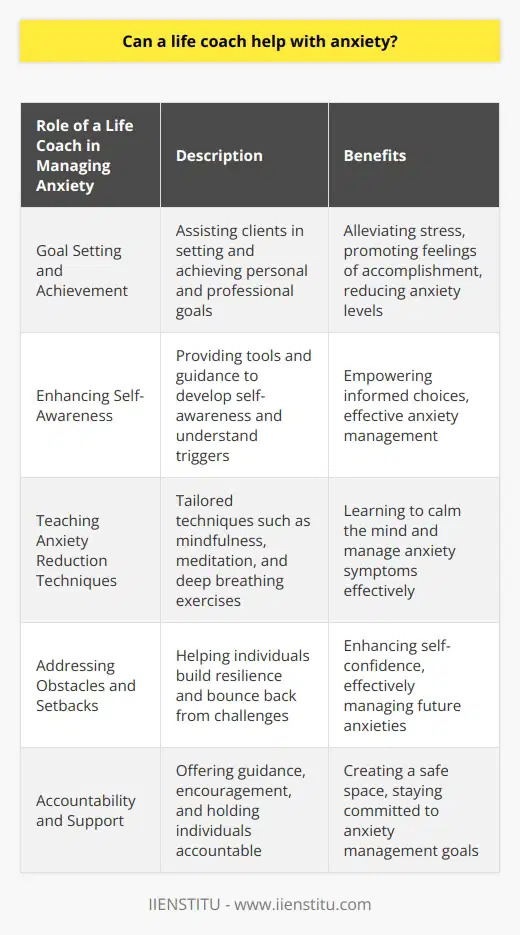
What are the 3 fears you need to overcome if you want to be successful?
Overcoming the Fear of Failure
One critical fear to conquer in the pursuit of success is the fear of failure. This fear may prevent individuals from striving for their goals, paralyzing them with self-doubt. Overcoming this fear involves accepting the possibility of failure and adapting a growth mindset to learn from setbacks.
Confronting the Fear of Rejection
The second fear hindering the path to success is the fear of rejection. Individuals seeking successful careers or personal relationships may experience this apprehension. Addressing this fear includes understanding that rejection is a natural part of life and developing resilience to bounce back from a negative response.
Challenging the Fear of the Unknown
Lastly, the fear of the unknown often acts as a barrier to success. Those who wish to find success in their endeavors must tackle this fear by embracing change, being open to new experiences, and employing effective planning and decision-making strategies. This approach allows individuals to overcome uncertainty and navigate their paths towards success with confidence.
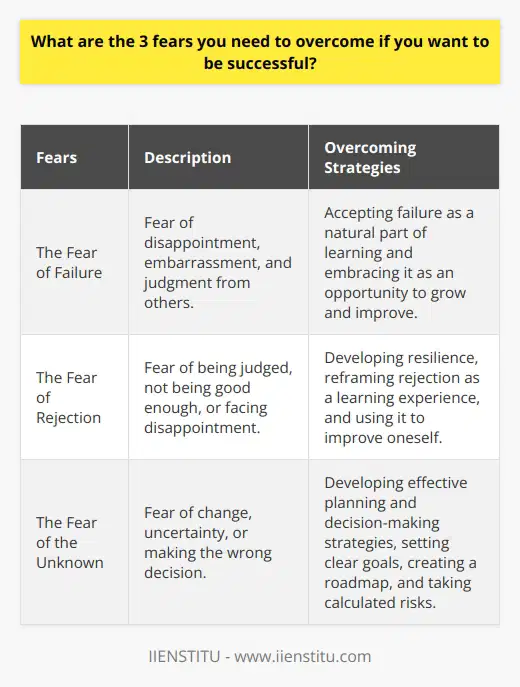
What techniques can be employed by a life coach to help clients distinguish between rational and irrational fears?
Techniques to Identify Rational and Irrational Fears
Understanding the Nature of Fears
Life coaches can help clients examine the nature of their fears to determine whether they are rational or irrational. By analyzing the root causes and potential consequences, clients can separate legitimate concerns from unfounded anxieties. A fear is considered rational when it is based on a genuine threat, while an irrational fear stems from misguided perceptions or beliefs.
Cognitive Restructuring Techniques
Cognitive restructuring can be effective for challenging irrational fears. This technique involves identifying and replacing negative thought patterns with more rational ones. Life coaches can guide clients to assess their fears objectively and determine whether they accurately reflect reality. Cognitive restructuring can reduce the intensity of irrational fears, helping clients focus on constructive ways to deal with their anxieties.
Exposure to Challenging Situations
Practicing exposure is another technique for addressing irrational fears. Life coaches can support clients to gradually confront their fears by exposing them to the situations they dread. By facing their fears in a controlled and safe environment, clients can develop coping mechanisms and build confidence.
Empowering the Client
Effective life coaches also empower their clients to take control of their lives by providing them with tools to manage their fears. Clients must be encouraged to take responsibility for their reactions and given the skills to handle challenging situations. By developing coping strategies and self-soothing techniques, clients can learn to manage their fears and enhance their sense of control.
Evaluating Progress
Assessing progress is crucial for both the life coach and the client. Regularly reviewing the client's progress can help identify areas of improvement, as well as setbacks that need addressing. This enables the life coach to provide tailored support and guidance for overcoming irrational fears.
In summary, life coaches can employ a range of techniques to help clients distinguish between rational and irrational fears. By analyzing the nature of fears, utilizing cognitive restructuring, practicing exposure, empowering clients, and evaluating progress, life coaches can support their clients to overcome irrational fears and enhance their overall well-being.
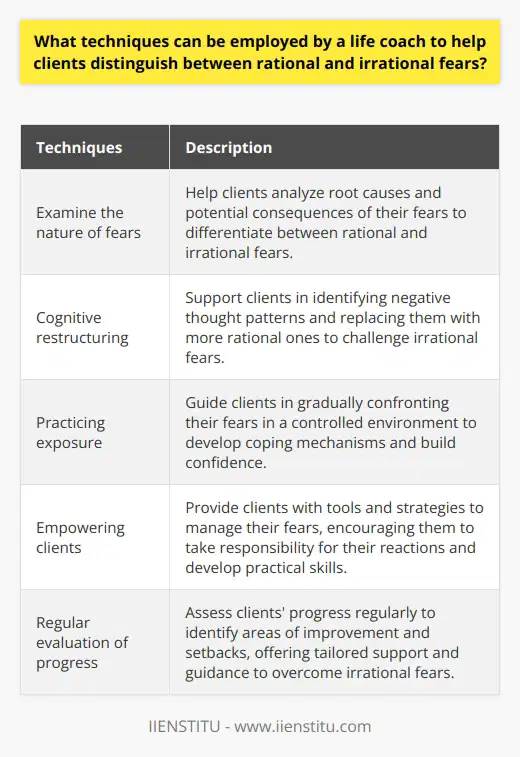
How can life coaching assist individuals in developing healthy coping strategies for anxiety management?
Life Coaching for Anxiety Management
Life coaching, as a profession, involves helping individuals identify and develop healthy coping strategies for various life challenges, including anxiety management. Through a collaborative relationship, life coaches can guide clients in recognizing anxiety triggers, developing awareness of their reactions, and building healthier ways to respond.
Identifying Anxiety Triggers
The first step in managing anxiety is understanding its causes. Life coaches work closely with clients to identify their unique anxiety triggers, such as work-related stress, relationship issues, or past traumatic experiences. By pinpointing the root of anxiety, individuals can better address and manage their emotional responses.
Developing Awareness of Reactions
Life coaches also focus on helping clients develop self-awareness regarding their reactions to anxiety-inducing situations. This awareness aids individuals in recognizing unhealthy coping strategies, such as avoidance, self-criticism, or engaging in harmful behaviors. Through self-exploration and reflection, life coaches support clients in understanding the underlying patterns behind their anxiety responses.
Building Healthier Coping Strategies
Once clients have developed an understanding of their anxiety triggers and reactions, life coaches can assist them in creating healthier coping strategies. These techniques may include practicing mindfulness, engaging in regular physical activity, or employing relaxation methods, such as deep breathing or progressive muscle relaxation. Life coaches can also help clients challenge negative thought patterns and reframe their perspective, ultimately reducing the intensity of anxiety.
Measuring Progress and Adjustments
Life coaches play a crucial role in tracking clients' progress and making necessary adjustments to ensure the effectiveness of their coping strategies. Through regular check-ins, life coaches evaluate the success of various techniques and collaboratively modify strategies to optimize their impact. This allows individuals to continuously adapt and improve their anxiety management skills.
In conclusion, life coaching can provide valuable support in developing healthy coping strategies for anxiety management. By identifying triggers, cultivating self-awareness, and building new habits, individuals can better navigate anxiety-inducing situations and improve their overall mental health. Additionally, life coaches offer crucial accountability and guidance, empowering clients to take control of their anxiety and live more fulfilling lives.
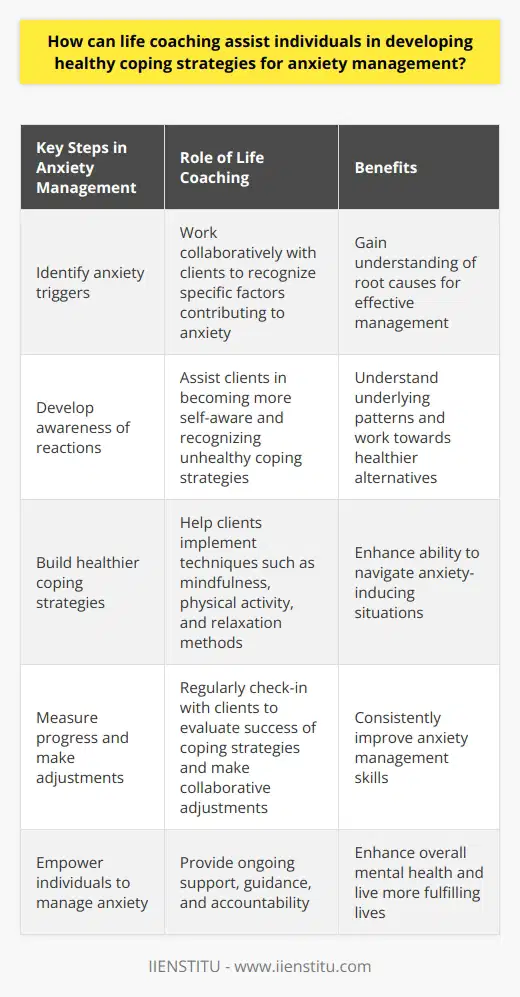
Can life coaching help with anxiety and enable individuals to lead more fulfilling lives?
Life Coaching’s Impact on Anxiety
Life coaching can significantly aid in managing anxiety. It utilizes a person-centered approach, focusing on individuals' inherent potential to understand and resolve their issues.
Addressing Anxiety through Life Coaching
Firstly, life coaching helps individuals identify their anxiety triggers. Coaches encourage clients to introspect, increasing their self-awareness. This awareness results in early identification and reduction of potential stressors.
Coping Mechanisms
Life coaches also equip individuals with coping mechanisms. They deliver techniques for stress management. Mindfulness, meditation, and cognitive restructuring are a few recommended strategies that have proven successful for numerous clients.
Fostering Positive Attitude
Promoting a positive attitude is a key element of life coaching. Life coaches foster resilience, optimism, and self-efficacy, qualities that counteract the negative thought patterns associated with anxiety.
Boosting Self-confidence
Life coaches help build self-confidence. They assist individuals in setting and reaching attainable goals, which increases self-esteem and reduces anxiety levels.
Enhanced Quality of Life
By effectively managing anxiety, individuals can lead more fulfilling lives. Anxiety often causes withdrawal, hindering experiences and limiting potential. A reduction in anxiety enables individuals to experience personal growth and propels them towards a more satisfying lifestyle.
In conclusion, life coaching can significantly help with anxiety. It helps individuals gain insight into their triggers, equips them with coping strategies, promotes positivity, and builds self-confidence. The abatement of anxiety subsequently improves the quality of life, making it more fulfilling. Therefore, life coaching is an effective tool for anxiety management and promoting satisfaction in life.
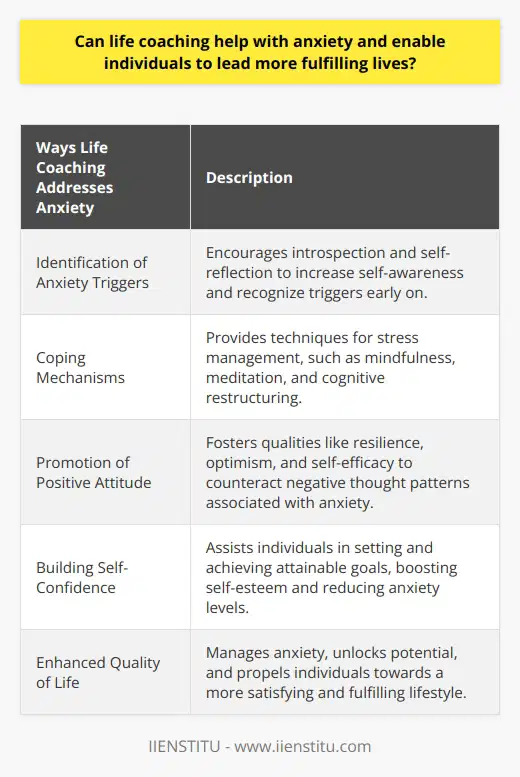
In what ways can a life coach support clients in identifying and overcoming the fears that may be holding them back from success?
Establishing Clarity and Self-Awareness
A life coach can support clients in recognizing their fears by facilitating self-awareness. Through introspection, clients can become clear on what their specific fears are. This is the first step to overcoming obstacles to success.
Building Confidence and Assurance
Life coaches can also boost clients' confidence by setting achievable goals and celebrating small victories. By this, clients can gradually build confidence and overcome fears. They learn to perceive failures not as catastrophe, but as opportunities for growth.
Creating a Progressive Action Plan
Life coaches work with clients to create action plans. These plans establish what steps clients need to take towards overcoming their fears. Regular feedback and adjustments to the action plan ensure progress towards fear reduction and eventual elimination.
Providing Emotional and Mental Support
Life coaches can provide emotional and mental support to tackle fear. They respond compassionally and constructively to clients' experiences, offering reassurance and promoting resilience.
Encouraging Healthy Coping Mechanisms
Life coaches promote healthy coping mechanisms. They teach techniques such as mindfulness, breathing exercises, or journaling. These tactics can help clients manage their fears and reduce stress, thus encouraging a strong mindset towards success.
Promoting Accountability
Finally, life coaches act as an accountability partner. This means they ensure clients follow through with action plans. Regular check-ins and progress tracking can reinforce a client's commitment to overcoming their fears.
In summary, life coaches can significantly aid clients in overcoming their fears. They do this by building self-awareness, boosting confidence, creating action plans, providing emotional support, teaching coping mechanisms, and promoting accountability.
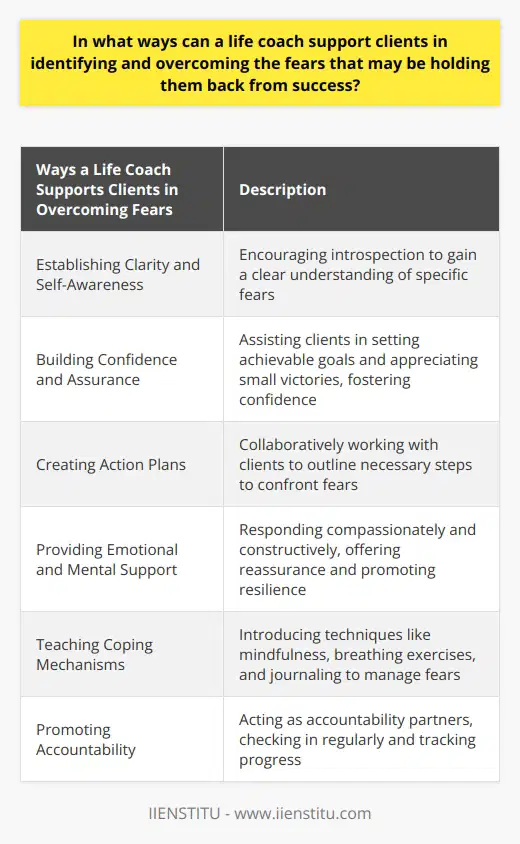
How can a life coach facilitate the process of confronting and overcoming anxiety through the development of personalized coping strategies and techniques?
Techniques Employed by Life Coaches
A life coach can aid in the battle against anxiety through several specific techniques. Primarily, they develop unique coping strategies that are personalized to the client. These strategies are designed to help the individuals identify the sources of their anxiety, thereby making it more manageable.
Tailored Approach
Coaches utilize a personalized approach because anxiety differs from person to person. The triggers, severity, and coping mechanisms vary significantly among individuals. Tailored techniques ensure that the strategies are ideally suited to the individual, enhancing their effectiveness.
Establishing a Positive Mindset
Life coaches strive to instill a positive mindset in their clients. This positivity serves as a buffer against anxiety, building resilience, boosting self-belief, and encouraging individuals to face their fears. It also aids in facilitating a more optimistic perspective on life.
Stress Management
Another significant aspect of overcoming anxiety is managing stress. Coaches typically utilize stress management techniques, such as mindfulness, relaxation exercises, and slow breathing to help clients manage and cope with stress effectively.
Goal Setting
Life coaches emphasize setting achievable goals. Setting smaller, manageable goals can play a pivotal role in managing anxiety. By cultivating a sense of accomplishment, it boosts confidence and encourages individuals to face their anxiety head-on.
Careful Guidance
The life coach guides and supports individuals every step of the way. They provide a safe and non-judgemental space for the clients to express their fears and anxieties, and work through them together. This support system can prove instrumental in overcoming anxiety.
In summation, a life coach can greatly assist in overcoming anxiety through personalized coping strategies and techniques. By fostering positivity, managing stress, setting achievable goals, and providing support, life coaches can make the anxiety management process more achievable and less daunting for those struggling.
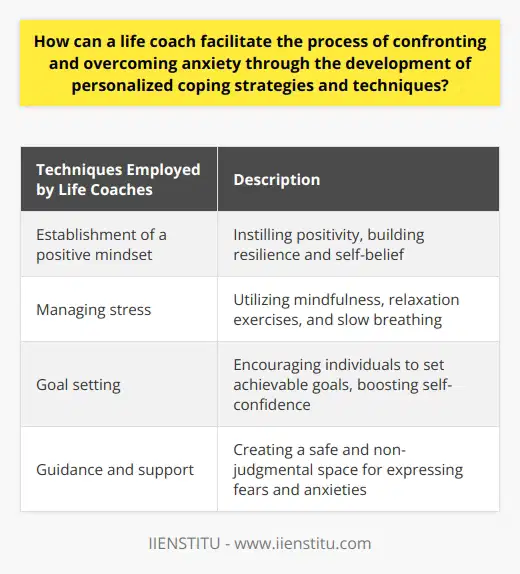
Can life coaching help with anxiety by promoting self-awareness and fostering the development of effective coping strategies?
The Role of Life Coaching in Reducing Anxiety
Life coaching has considerable potential in addressing anxiety-related issues. It aims to foster self-awareness, a key component in managing and overcoming anxiety. Heightened self-awareness helps the individual understand their anxiety triggers and responses better. This understanding is crucial in forming personalized coping strategies.
Creating Personalized Coping Strategies
Through life coaching, an individual can develop effective coping strategies. Coaches guide individuals to identify their unique stressors and devise methods to manage or eliminate them. This process is highly personalized, considering the person's preferences and lifestyle.
Promoting Healthy Lifestyle Choices
A significant aspect of life coaching is encouraging a healthy lifestyle, which indirectly addresses anxiety. Regular physical exercise, nutritious diet, adequate sleep and relaxation techniques are usually emphasized. Such changes can lead to better physical and mental health, reducing anxiety levels.
Building Confidence and Self-Esteem
Life coaching also helps foster self-confidence and improve self-esteem. By setting and achieving small, realistic goals, individuals can enhance their sense of competence and control. This can be especially helpful for those with anxiety, who often feel overwhelmed and helpless.
In Conclusion
Life coaching can indeed help with anxiety by promoting self-awareness and fostering the development of effective coping strategies. It is not a replacement for professional medical or psychological interventions, but serves as a complementary approach. It can provide a solid foundation for dealing with anxiety, equipping individuals with tools and strategies that serve them throughout life.
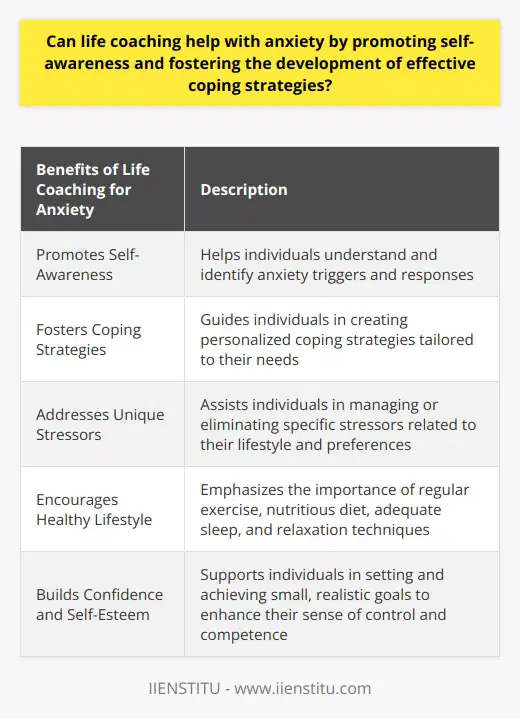
What are some common techniques used by life coaches to help clients identify, confront, and ultimately overcome their fears related to anxiety?
Cognitive-Behavioral Techniques
One popular method used by life coaches to help clients handle anxiety-focused fears is the application of cognitive-behavioral techniques. This approach involves identifying and challenging negative thought patterns that drive anxiety.
Reframing Negative Thoughts
Life coaches use reframing techniques to alter a client's perception of fear-inducing situations. By modifying the narrative, life coaches can help clients see their anxieties in a different, less threatening light.
Exposure Therapy
Exposure therapy is another widely-used technique. Gradually, clients face their fears in a controlled and safe environment, building self-assuredness as their anxiety levels decrease every time they confront the fear.
Mindfulness and Relaxation Techniques
Through mindfulness and relaxation exercises, life coaches guide clients to stay in the present moment and relax. Techniques like guided imagery, deep-breathing exercises and progressive muscle relaxation can significantly lower anxiety levels.
Goal Setting
Finally, setting achievable goals for anxiety management helps individuals gain control over their fears. Breaking down anxiety-inducing situations into manageable tasks and working systematically allows the client to build confidence and resilience against anxiety.
Thus, through a combination of strategies involving cognitive restructuring, exposure, relaxation techniques, and goal setting, life coaches aid their clients in confronting and ultimately overcoming anxiety-related fears.
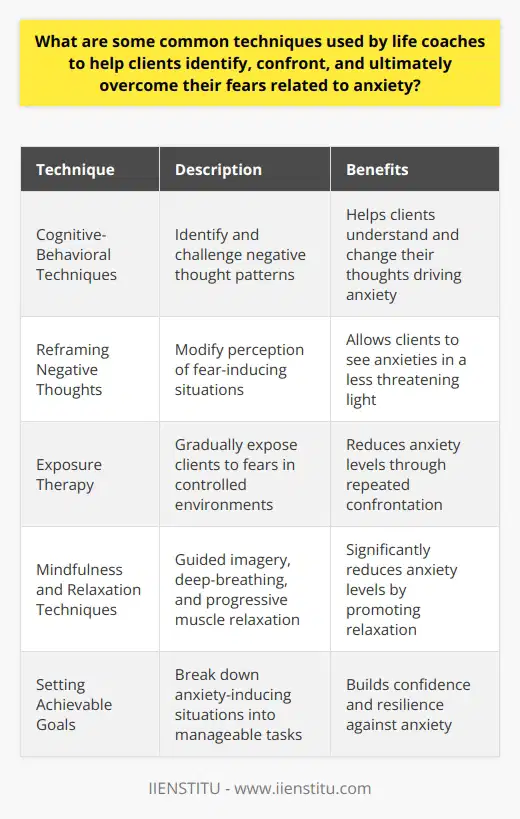
How can a life coach support individuals in facing their fears and managing anxiety in the context of personal and professional growth?
Enhancing Coping Skills
A life coach can aid in bolstering coping skills. They help individuals to view their fears and anxiety not as obstructions, but as catalysts for growth. Through activities like role-playing or guided visualization, a life coach encourages clients to reframe these emotions in a positive light.
Developing Emotional Intelligence
An element of conquering fears is understanding them. A life coach aids in developing emotional intelligence. They enable individuals to identify, understand, and manage their emotions effectively. In doing so, they facilitate a clearer perception of fears and devise strategies to combat anxiety.
Promoting Mindfulness
Life coaching also encompasses promoting mindfulness, a potent tool against anxiety. By encouraging presence in the moment, a life coach helps clients stave off anxious thoughts. They can guide meditation practices that help clients to foster an assertive response to fear.
Encouraging Adaptive Thinking
Life coaches help individuals to think adaptively. By challenging negative thought patterns, they enable their clients to alter perspective. This way, individuals become better equipped to combat fears and manage anxiety within their personal and professional realms.
Building a Growth Mindset
Life coaches foster a growth mindset. They help individuals understand that challenges, including fears and anxieties, are part and parcel of growth. By focusing on effort rather than outcomes, life coaches steer individuals towards embracing continuing development.
Facilitating Meaningful Relationships
Moreover, life coaches facilitate better interpersonal relationships by encouraging communication and empathy. This can help alleviate the anxiety associated with personal and professional interactions, and embolden individuals to face their fears.
In conclusion, a life coach supports individuals' personal and professional growth by equipping them with the necessary tools to face their fears and manage anxiety. They do this through strengthening coping skills, fostering emotional intelligence, promoting mindfulness, encouraging adaptive thinking, nurturing a growth mindset, and facilitating meaningful relationships.
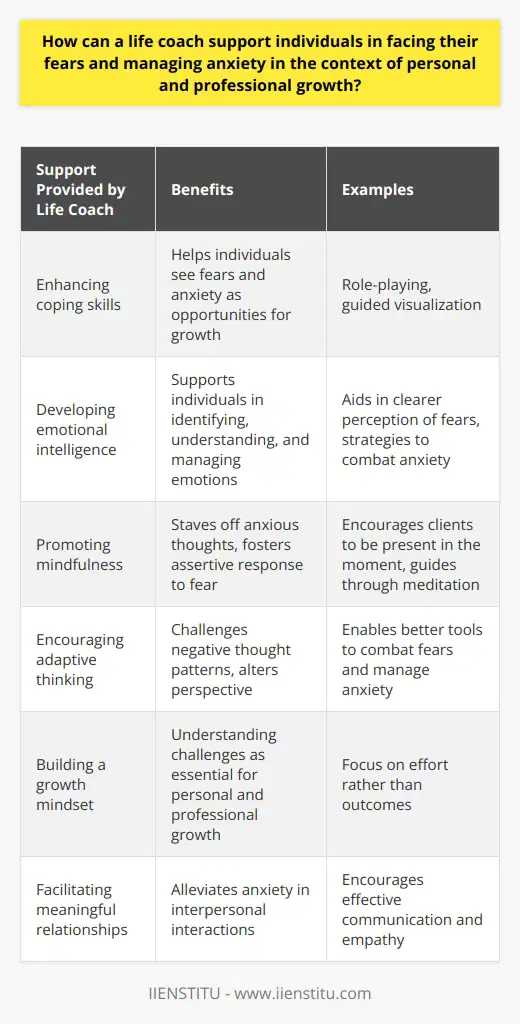
Can life coaching help with anxiety by promoting self-awareness and fostering the development of effective coping strategies?
Understanding Life Coaching’s Role in Managing Anxiety
It is vital to understand the specific role of life coaching in managing anxiety. By promoting self-awareness, life coaches cultivate a sound environment for individuals to delve into their internal processes.
Increasing Self-awareness
Life coaching can reveal elements of a person's psyche which they may not have considered previously. Coaching can encourage individuals to reflect on their thoughts, feelings, and behaviors. Understanding these patterns often helps to manage anxiety more effectively.
Developing Coping Strategies
Additionally, life coaching aids in the development of effective coping strategies. Coaches can provide tools tailored to the individual's specific requirements. For instance, relaxation techniques or cognitive reframing can facilitate healthier responses to anxiety triggers.
Personalized Solutions
Life coaching offers personalized solutions, unlike one-size-fits-all approaches. Customized strategies address not only the symptoms of anxiety but its roots as well. Unearthing these roots can lead to more sustainable solutions.
Continuous Support
Life coaching also provides ongoing support. Regular interaction with the coach helps maintain motivation, celebrate progress, and decide on future objectives.
Scientific Evidence
Emerging research supports these assertions. A study in the Journal of Positive Psychology showed life coaching improved overall well-being and reduced stress and anxiety levels.
Assessing Effectiveness
It is critical to assess the effectiveness of life coaching in managing anxiety on an individual basis. Factors such as the coach's approach, client's commitment, and the severity of anxiety all contribute to effectiveness.
In conclusion, life coaching can undoubtedly help individuals manage their anxiety. By promoting self-awareness and developing effective coping strategies, life coaching provides a supportive and personalized approach to mental health.

In what ways can a life coach support clients in identifying and overcoming the fears that may be holding them back from success?
Understanding Client Fears
A life coach can support clients by helping them understand their fears. They facilitate a conversation that encourages clients to articulate their anxieties.
Identification of Fears
Life coaches use various techniques to identify clients' fears. They may use reflective questioning, psychometric tests, or therapeutic strategies. This identification process guides individuals in recognizing underlying fears.
Analyzing Roots of Fears
Understanding the roots of fears is crucial. Life coaches navigate clients through their past experiences and perspectives. They help clients decipher how these elements influence their present fears.
Establishing Safe Space
Life coaches establish a safe space for clients. Within this space, clients can explore their fears without judgment or pressure. This environment fosters trust and open communication.
Overcoming Fears
Life coaches assist clients in overcoming fears by encouraging them to face these fears. They may use cognitive-emotional strategies like exposure therapy, cognitive restructuring, or scenario planning.
Goal Setting
By setting pragmatic yet challenging goals, life coaches motivate clients to overcome fears. The process of achieving these goals encourages clients to step out of their comfort zones.
Continuous Support and Accountability
Life coaches provide continuous support and hold clients accountable for their progress. They celebrate success, which boosts clients' self-esteem and confidence, aiding them in overcoming fears.
Conclusion
Overall, life coaches play a significant role in supporting clients to identify and overcome their fears. Through their expert guidance, clients can navigate their fears and work towards success.

How can life coaching assist individuals in developing healthy coping strategies for anxiety management?
Promoting Healthy Coping Strategies
Life coaching can assist individuals in managing anxiety by providing a source of support, and promoting resilience. Coaches offer practical strategies for managing symptoms, such as stress-reducing techniques. These can include mindfulness practices, deep-breathing exercises, or progressive muscle relaxation.
Enhancing Self-understanding and Resilience
Life coaches work with individuals to understand their anxiety triggers, facilitating the development of healthier responses to stress. The coach can assist in challenging negative thinking patterns that can perpetuate anxiety, using techniques such as cognitive behavioural coaching. The emphasis on resilience, self-efficacy, and resourcefulness can foster a sense of empowerment.
Supporting Goal Setting and Monitoring
Coaches can guide individuals in identifying their personal and professional goals, which may lessen anxiety by providing a sense of purpose and direction. Coaches can support individuals in setting, tracking, and achieving these goals, offering motivation and accountability.
Encouraging Healthy Lifestyle Choices
Life coaching promotes overall wellness and healthier lifestyle choices which can have a profound effect on anxiety management. Coaches can collaborate with individuals to create a holistic health plan considering nutrition, exercise, sleep, and work-life balance.
Providing a Supportive Environment
Lastly, life coaching creates a safe and non-judgemental space for individuals to discuss their anxiety. Coaches provide emotional support, validation, and encouragement to their clients, making them feel heard and understood.
In conclusion, life coaching serves as an effective tool in assisting individuals to manage anxiety. With structured guidance, it can foster the growth of self-understanding, resilience, goal orientation, healthy lifestyle habits, and emotional well-being.



